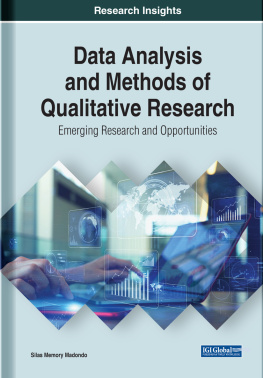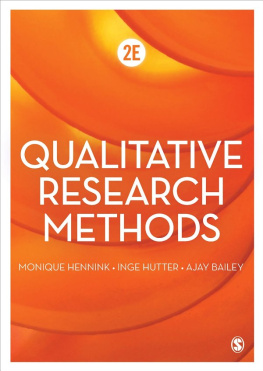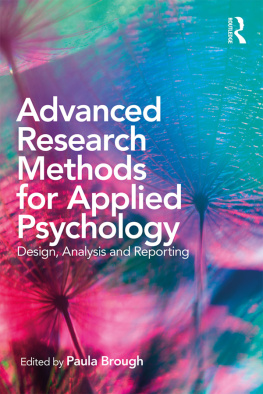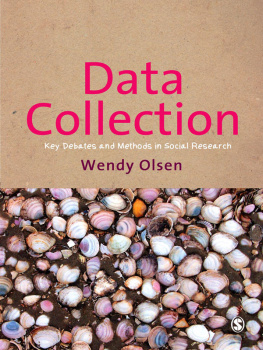SAGE Publications Ltd
1 Olivers Yard
55 City Road
London EC1Y 1SP
SAGE Publications Inc.
2455 Teller Road
Thousand Oaks, California 91320
SAGE Publications India Pvt Ltd
B 1/I 1 Mohan Cooperative Industrial Area
Mathura Road
New Delhi 110 044
SAGE Publications Asia-Pacific Pte Ltd
3 Church Street
#10-04 Samsung Hub
Singapore 049483
Caroline J. Oates and Panayiota J. Alevizou 2018
Editors Introduction Bill Lee, Mark N. K. Saunders and Vadake K. Narayanan 2018
First published 2018
Apart from any fair dealing for the purposes of research or private study, or criticism or review, as permitted under the Copyright, Designs and Patents Act, 1988, this publication may be reproduced, stored or transmitted in any form, or by any means, only with the prior permission in writing of the publishers, or in the case of reprographic reproduction, in accordance with the terms of licences issued by the Copyright Licensing Agency. Enquiries concerning reproduction outside those terms should be sent to the publishers.
Library of Congress Control Number: 2017938616
British Library Cataloguing in Publication data
A catalogue record for this book is available from the British Library
ISBN 978-1-47394-821-1
ISBN 978-1-47394-822-8 (pbk)
Editor: Kirsty Smy
Assistant editor: Lyndsay Aitken
Production editor: Sarah Cooke
Copyeditor: William Baginsky
Proofreader: Thea Watson
Indexer: Judith Lavender
Marketing manager: Alison Borg
Cover design: Francis Kenney
Typeset by: C&M Digitals (P) Ltd, Chennai, India
Printed in the UK
Editors Introduction to the Mastering Business Research Methods Series
Welcome to the Mastering Business Research Methods series. In recent years, there has been a great increase in the numbers of students reading masters level degrees across the business and management disciplines. A great number of these students have to prepare a dissertation towards the end of their degree programme in a timeframe of three to four months. For many students, this takes place after their taught modules have finished and is expected to be an independent piece of work. Whilst each student is supported in their dissertation or research project by an academic supervisor, the student will need to find out more detailed information about the method that he or she intends to use. Before starting their dissertations or research projects these students have usually been provided with little more than an overview across a wide range of methods as preparation for this often daunting task. If you are one such student, you are not alone. As university professors with a deep interest in research methods, we have provided this series of books to help students like you. Each book provides detailed information about a particular method to support you in your dissertation. We understand both what is involved in masters level dissertations, and what help students need with regard to methods in order to excel when writing a dissertation. This series is the only one that is designed with the specific objective of helping masters level students to undertake and prepare their dissertations.
Each book in our series is designed to provide sufficient knowledge about either a method of data collection or a method of data analysis, and each book is intended to be read by the student when undertaking particular stages of the research process, such as data collection or analysis. Each book is written in a clear way by highly respected authors who have considerable experience of teaching and writing about research methods. To help students find their way around each book, we have utilised a standard format, with each book organised into six chapters:
- introduces the method, considers how the method emerged for what purposes, and provides an outline of the remainder of the book.
- addresses the underlying philosophical assumptions that inform the uses of particular methods.
- discusses the components of the relevant method.
- considers the way in which the different components may be organised to use the method.
- provides examples of published studies that have used the method.
- concludes by reflecting on the strengths and weaknesses of that method.
We hope that reading your chosen book helps you in your dissertation.
Bill Lee, Mark N.K. Saunders and V.K. Narayanan
About the Series Editors
Bill Lee,PhD, is Professor of Accounting and Head of the Accounting and Financial Management Division at the University of Sheffield, UK. He has a long-standing interest in research methods and practice, in addition to his research into accounting and accountability issues. Bills research has been published widely, including in:
Accounting Forum;
British Accounting Review;
Critical Perspectives on Accounting;
Management Accounting Research;
Omega; and
Work, Employment & Society. His publications in the area of research methods and practice include the co-edited collections
The Real Life Guide to Accounting Research and
Challenges and Controversies in Management Research.
Mark N.K. Saunders,BA MSc PGCE PhD FCIPD, is Professor of Business Research Methods at Birmingham Business School, University of Birmingham, UK. His research interests are research methods, in particular methods for understanding intra organisational relationships; human resource aspects of the management of change, in particular trust within and between organisations; and small and medium-sized enterprises. Marks research has been published in journals including
Journal of Small Business Management,
Field Methods,
Human Relations,
Management Learning and
Social Science and Medicine. He has co-authored and co-edited a range of books including
Research Methods for Business Students (currently in its sixth edition) and the
Handbook of Research Methods on Trust.V.K. Narayananis the Associate Dean for Research, Director of the Center for Research Excellence, and the Deloitte Touch Stubbs Professor of Strategy and Entrepreneurship in Drexel University, Philadelphia, PA. His articles have appeared in leading professional journals such as
Academy of Management Journal,
Academy of Management Review,
Accounting Organizations and Society,
Journal of Applied Psychology,
Journal of Management









